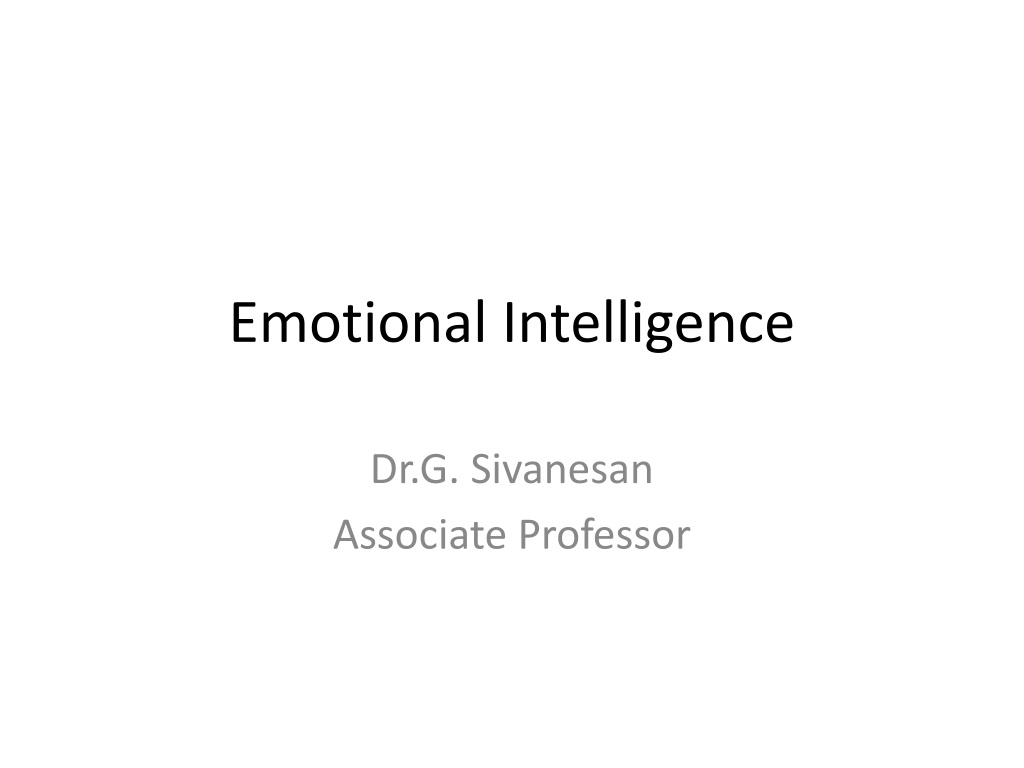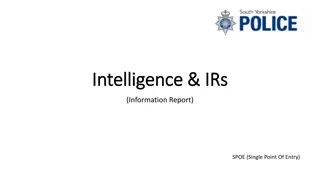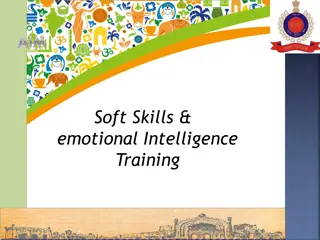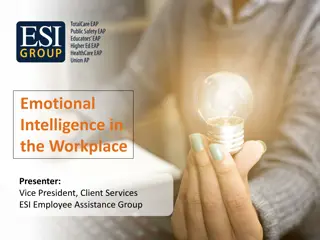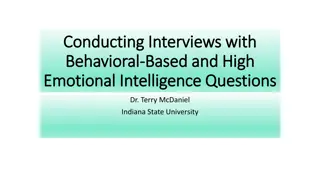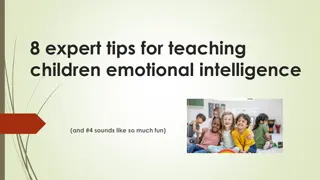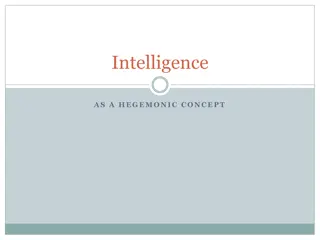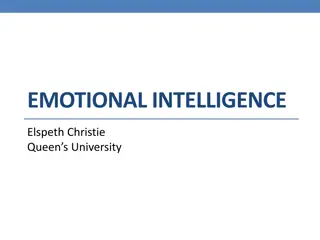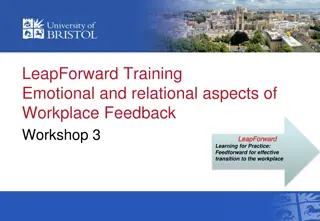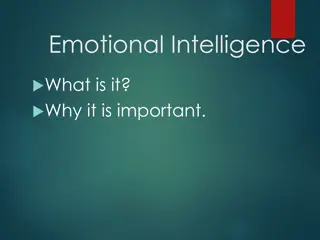Emotional Intelligence in the Workplace
Emotional Intelligence (EQ) is increasingly vital for leaders and employees in today's market. It enhances relationships, propels success, and fosters positive interactions. High EQ levels lead to better leadership, improved employee experiences, and stronger customer relationships. Utilizing EQ can inspire higher performance, prevent burnout, and benefit overall company culture.
Download Presentation

Please find below an Image/Link to download the presentation.
The content on the website is provided AS IS for your information and personal use only. It may not be sold, licensed, or shared on other websites without obtaining consent from the author. Download presentation by click this link. If you encounter any issues during the download, it is possible that the publisher has removed the file from their server.
E N D
Presentation Transcript
Emotional Intelligence Dr.G. Sivanesan Associate Professor
EQ Intro In years past, the emotional intelligence of employees was low on the list of qualifications, especially for leaders. However, with the way that the market has changed, how someone connects with others on an emotional level is becoming much more important. Company leaders need to connection audiences have with services, products and companies as a whole. The most recent Fjord Trends 2020 even talks about "liquid people" and why it is important to set up human insights teams instead of consumer insights. All this leads to the conclusion that now, more then ever before, if you want to successfully lead your company or grow your startup, you will need to understand what emotional connections are and how they can propel you forward. understand the emotional
How is EQ a KPI for emotional connections EQ is a term that describes the emotional intelligence that people in the workplace have with each other, and also with the customers or clients of that company. It propels the relationships that people build with one another and can also be applied outside of work. In general, EQ is thought characteristics, including (i) Self-awareness (being aware of how we respond in situations), (ii) Self-management (how we apply that self-awareness), (iii) Social awareness (how we perceive others' feelings in the context of their environments) and (iv) Social management (how we apply social awareness in order to have fruitful interactions with others). to have four distinct
How does EQ make leaders more successful? The way people connect allows them to understand what others are going through, which can be the perfect way to help solve someone s pain points. Leaders with high levels of emotional intelligence often notice how people around them observe, react and respond. Knowing how to respond appropriately in all situations, both in private and in a group, allows for better experiences with the people around us. As leaders, we want to create the best employee experience possible so that those positive experiences trickle down into how our company s representatives treat clients and customers. In turn, this can help build positive, trusting relationships with customers.
Where can EQ be utilized in todays companies? The greatest thing about emotional intelligence is that it has endless applications. It can be used to help inspire higher performance, develop new products and services, and opportunities. It can also be used to prevent burnout, as people who learn how to manage their emotions are often less overwhelmed and benefit from a better work-life balance. Higher EQ can benefit everyone in a company, from the CEO and founder all the way down to the latest part-time hire. But when it comes to helping improve the employee experience, leaders need to fully understand and utilize EQ regularly. The reason? When you understand where your employees are, both with the company and with the clients, you can better serve them. You can inspire them to strive for more fulfillment and give them challenges that allow them to feel as though they can accomplish even greater things. improve personal development
Increasing Your Emotional Intelligence: How Do Others React To You? Daniel Goleman, who popularized the term "emotional intelligence" in his groundbreaking book Emotional Intelligence, identified five key aspects of the skill: self-awareness, self- regulation, motivation, empathy and social skills. Here s how the question "How do others react to me?" addresses each aspect:
Self-Awareness The first component of emotional intelligence is understanding and recognizing your own emotions. This goes beyond correctly identifying your feelings. I believe a critical part understanding what Susan Scott, author of Fierce Conversations, termed your emotional wake": the effect of your actions, emotions and moods on other people. How the question helps: Asking how others react to you and taking the time to thoughtfully consider the answer helps illuminate understanding of ourselves. By noticing how others are reacting to us, we can identify patterns and make any necessary adjustments to our behavior to improve our relationships. of self-awareness is blind spots in our
Self-Regulation Self-regulation essentially means finding the right time, avenue and place to express your emotions. Rather than making rushed or emotionally driven decisions, verbally attacking others or compromising their values, people strong in self-regulation find the best time and method to express themselves. How the question helps: Considering how others react to you helps you take responsibility for your actions and understand how you influence others. If you often explode verbally, then others will react to you poorly (even when they are not the targets of your outburst). Observe how you influence others and notice what emotions they are expressing. This will provide you with information you need to maintain self-control.
Motivation While money and social status can be motivating factors for some, emotionally intelligent motivation refers to a sense of being motivated by enjoying what you do, consistently working toward goals and setting high standards for yourself, even when surrounded by obstacles. How the question helps: Leaders who display low motivation tend to cause others to react with cynicism or disbelief. Often they come across as pessimistic or disengaged. If you find that others are reacting pronouncements with a sense of weariness, or if they seem to feel the need to constantly cheer you up, it s time to examine your motivation. Think about why you are doing your job, set goals that energize you and find something to be positive about to your ideas and
Empathy The ability to put yourself, emotionally, into another person s situation component of emotional intelligence. It allows you to develop your team, give constructive feedback, provide an ear to those in need and challenge those who are acting unfairly. Demonstrating and acting out of empathy will earn the loyalty and respect of your team because it will show them (as opposed to telling them) that you care. is a critical
Empathy How the question helps: Simply asking how others are reacting to you provides an empathetic viewpoint. It encourages you to understanding than facial cues can provide. When you consider the reactions of others, you also want to know why they are reacting that way. Accomplishing that means behavior from the viewpoint of another. Gaining an understanding of how others react to you can help you respond to their feelings and more effectively communicate. look for a deeper considering your
Social Skills In the context of emotional intelligence, social skills refer to your communication skills, conflict management, rapport building and your ability to be a good team-player. Another aspect of social skills is how able you are to tune into another person s feelings and understand how they think about things. Leaders with high social skills resolve conflicts diplomatically, provide feedback often and lead by example.
Social Skills How the question helps: When we tune into other people s reactions to our behavior, we are practicing our social skills. Watch the reactions of others to help you understand their feelings about your behavior. In doing so, you gain insights into how they feel about other things as well. Huge increases in overall emotional intelligence can be had when you ask yourself this question during conversations and then change your approach as needed.
Practice As a leader, your main goal is to maximize the potential of your team by aligning them toward clear objectives. When you consistently tune in to how others react to you, you are poised to be a great leader who delivers both business and people results. Try asking yourself this key question at least once a day for one week and watch your emotional intelligence grow.
